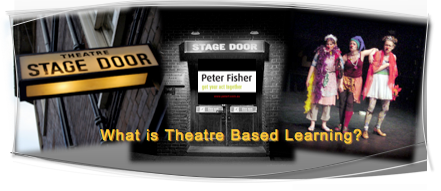
Peter Fisher, January 2013
As an actor, the most powerful experiences I ever had were those moments on stage when I felt a true connection with the audience. One is truly "present": not concerned about future or past but truly in the moment. Not only did I know that what I was doing was influencing the thoughts feelings and behaviours of the audience in that moment in time, but that I also had a powerful intuitive sense. It was like all of the senses were tuned in to theirs. I would create subtle shifts in the performance intuitively, without thinking about it, with amazing results in terms of the impact on the audience. It wasn't planned. It came deep from within. The psychology of the experience of being in that "zone" fascinated me.
"The Map is not the Experience of the Territory"
Improvising, or "thinking on your feet" in front of an audience is also an incredibly powerful experience. Actors fine-tune their craft through improvisation, or "theatre sports". Shows on TV such as "Thank God you're here" and "Whose line is it anyway" are great examples of individuals and teams of performers so present and intuitively engaged that they have an enormous impact on the audience. None of this is planned in advance.
Thinking on your feet is a very powerful way of getting a message across and influencing others. Great leaders have this ability. You only have to watch Barrack Obama or Hilary Clinton speaking off the cuff, or corporate leaders such as Richard Branson or Steve Jobs. Whenever Jobs walks out on the stage you can almost cut the air with a knife; it is thick with anticipation, excitement and wonder as he weaves his magic. He never uses a script. He is always in the "zone".
"Becoming a Star Performer"
Actors in their training don't read books on how to act or pick up scripts and just get better at delivering them. The skills they develop are linked to a strong foundation and knowledge of self and social awareness. Actors develop these skills through experiential learning processes which focus heavily on self perception, personal impact and influence, listening, developing all senses, empathy, understanding the motivation of others, understanding, expressing and managing emotions in self and others, self-confidence, self-expression, optimism, visualisation... the list is huge. In other words an actors training is spent "deconconstructing" what it is to be human interacting with other humans.
Again the psychology of why this training worked fascinated me.
You can imagine how blown away I was when I read Daniel Goleman's first book "Emotional Intelligence" in 1994. Suddenly everything fell into place. This was the latest research into the very part of the brain that controls all I have been talking about: the Limbic System. And he even talked about it from a leadership perspective! To cut a long story short, I quickly drew on many of these "theatre-based" learning processes and activities to develop training and coaching methods for executives and leaders, with a particular focus on developing self and social awareness skills, presence, listening, developing self confidence, impact and influence, corporate story telling (thinking on your feet) and basic communication and performance in presentation skills.
And Goleman even used the term: "star performer"!
"Emotional competencies determine the difference between the average performer and 'the star performer' ".
Daniel Goleman
When this is applied to a leadership role, those who really shine above others and make a difference are leaders who combine cognitive and emotional intelligence. For a leader, one can't exist without the other.
Star Performers:
- Have a strong sense of self: their personal impact and ability to influence.
- Visualise more and conceptualise less.
- Are able to manage their emotional responses and manage emotions in others. They skilfully use their emotions to be present with others, to listen, to empathize, to inspire, and to align others to their vision.
- Are able to think on their feet when communicating, engaging an audience strongly.
- Communicate from a personal level: willing to share experiences, learning's, insights and even past failures and weaknesses to mentor and develop others.
- See risks as opportunities; they trust intuitive responses to many situations.
- Develop an attentive mindfulness to all that they pursue: they have a "holistic" approach to their work, their relationships, and their well-being. This certainly relates to the issues of life balance and stress management, in themselves and others.
- Possess and create in others a strong sense of what it is to be part of a team and working collaboratively in conjunction with other teams, to benefit the organisation at large.